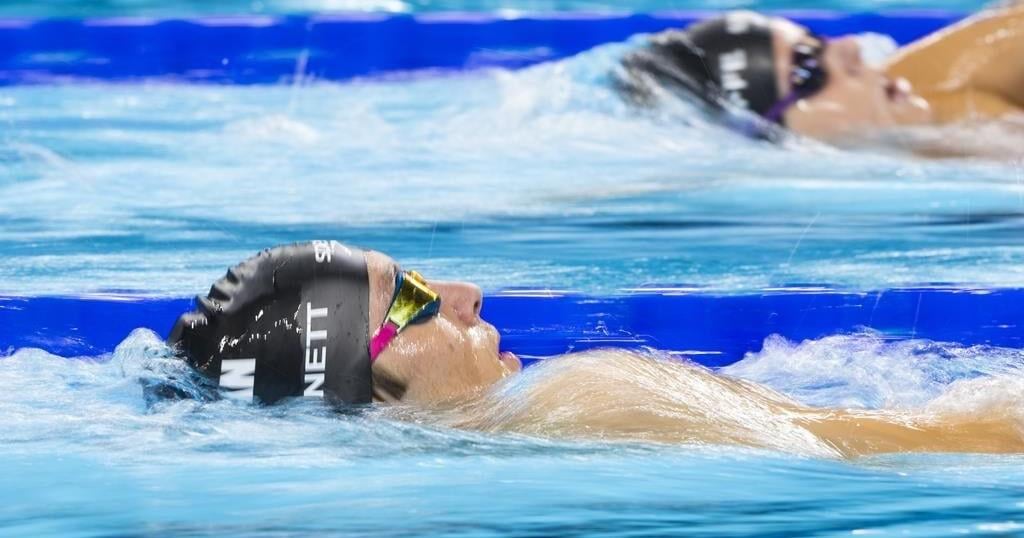PARIS – Tess Routliffe felt back where she belonged and Nicholas Bennett rose to the occasion for a pair of Paralympic Games silver medals in the pool Saturday.
Routliffe of Caledon, Ont., took silver in the women’s 200-metre individual medley eight years after the same result in Rio de Janeiro in 2016.
The 25-year-old didn’t compete in Tokyo three years ago because of a broken back she suffered when a barbell fell on her during a weight-training session.
“It’s been eight years since I’ve been at a Paralympic Games. That feeling is kind of indescribable,” Routliffe said. “I’m back in my happy place. I’m able to be Tess. I’m able to race.”
Bennett of Parksville, B.C., knocked over half a second off his previous best time in the men’s 200-metre freestyle to gain the first Paralympic medal of his career.
The 20-year-old, who is autistic, was beaten for gold by Britain’s William Ellard in a world-record time of one minute 51.30 seconds.
“It’s been two years since I dropped time in that race,” Bennett said.
“I’m actually ecstatic. I left everything in the pool and I’m currently feeling like I’m trying not to pass out. Absolutely gassed. There’s nothing left in the tank right now.”
Canada’s para swim team collected three medals in the first three days of racing at La Defense Arena, but awaited the first gold medal heading into Sunday.
Aurelie Rivard of Saint-Jean-sur-Richelieu, Que., was a bronze medallist in the 50-metre freestyle to open the meet.
Routliffe surged over the final 100 metres of the breaststroke and freestyle legs to vault from fifth to second behind victor Mallory Weggemann of the United States.
Routliffe passed Canadian teammate Danielle Dorris, who ran third with 50 metres to go but faded to sixth.
Dorris’s stronger event is still to come as the Moncton swimmer is the defending champion in the 50-metre butterfly.
“For Tess, having come from her Games in Rio, a silver medal in the same event, to Tokyo, breaking her back and not being able to compete, to coming here and performing the way she is, it’s incredible,” Dorris said.
“With Nick, I’m so happy for him as well. He had his first Games in Tokyo. He was just a little baby there, to now being an adult here and winning his first Paralympic medal.”
Routliffe was born with shortened limbs and Dorris with underdeveloped arms. They race the women’s SM7 classification. They kept each other relaxed in the ready room before racing each other Saturday.
“Just goofing off. She was dancing and I was laughing at her,” Dorris said.
Bennett was four-tenths of a second back of Ellard at the final turn, but the Brit pulled away with a mighty final 50.
“It’s anybody’s race until the end and he just went after it,” Bennett said. “That was a world-class swim for a world-class athlete.
“The last 50 is always the hardest for me.”
Bennett competes in the S14 class for athletes with an intellectual impairment. He’s coached by his sister Haley Bennett.
“I don’t think I’d be the athlete that I am without her,” Bennett said.
Routliffe’s sister Erin, who plays tennis for New Zealand, and Canada’s Gabriela Dabrowski are the defending U.S. Open women’s doubles champions. The duo was about to play a second-round match in New York following the swim race.
“She plays in like an hour. I have the day off tomorrow so I can watch Erin,” said Tess, who had the bulk of family members with her in Paris.
“This happens every four years. We were there last year. We supported her,” Routliffe said.
She’s the reigning world champion in the 100 breaststroke, which is Thursday.
“I was lucky to have the first two nights to watch, got to hear the crowd which is so loud, so insane,” Routliffe said.
“This France crowd is … it reminds me of Rio. It’s the Brazilians, but in French.”
This report by The Canadian Press was first published Aug. 31, 2024.
